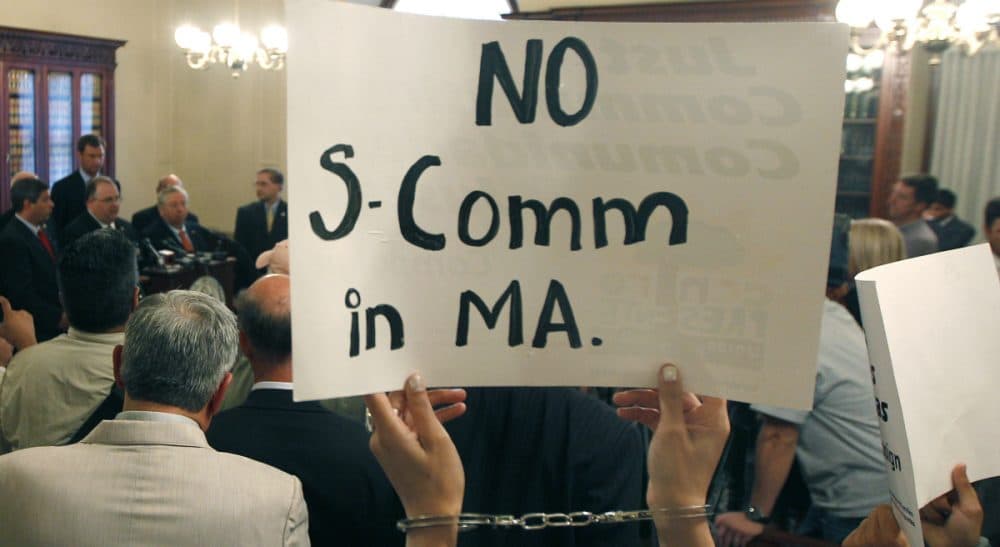Advertisement
Somerville's Smart Immigration Move — And Why The Rest Of Mass. Should Follow

On Wednesday, Somerville Mayor Joseph Curtatone plans to officially announce a bold move that will put his city on the map as a leader in public safety. Under an executive order, Somerville will no longer hold people on behalf of Immigration and Customs Enforcement (ICE) in order to facilitate their deportation.
Mayor Curtatone’s order, which is the first of its kind in the state, will implement at the city level the key changes promoted by the Massachusetts Trust Act, currently before the state Legislature. Only in cases where immigration agents have a criminal warrant, or Somerville officials have a legitimate law enforcement purpose not related to immigration, will Somerville police comply with federal ICE detainer requests to hold people for immigration purposes.
Curtatone’s announcement comes as cities, counties and states around the country push back against record-breaking deportations and federal immigration programs that have devastating effects on real lives and local communities. His move is a smart one for two reasons.
[The] order sends a strong message that the Somerville police are there to protect and serve local communities, not to do the bidding of federal immigration agents.
First, when local police are seen as enforcing immigration law, people become afraid to call the police when they are victims or witnesses to crime. As a result, everyone's safety suffers.
Two years ago, the federal government forced Massachusetts to participate in its signature deportation program, Secure Communities, which creates a direct information pipeline from local police to ICE whenever a person is arrested. This has led to 1,000 new deportations from our state, and created a rift between police and the communities they serve.
A national poll found that since the implementation of Secure Communities, 44 percent of Latinos are less likely to call the police if they witness or experience crime.
Somerville knows this well. As a one of the most diverse cities in Massachusetts, it knows that immigrants make up an important part of this vibrant community. Without their trust of law enforcement, crimes go unreported and witnesses fail to come forward.
Wednesday's order sends a strong message that the Somerville police are there to protect and serve local communities, not to do the bidding of federal immigration agents. Immigrants in that city can now feel sure that when they call 911, they and their loved ones will not be put into a direct path to ICE detention and deportation.
But the order is also wise in another way: when localities hold people on behalf of ICE, they spend their own resources and can be held liable if the detention is not up to constitutional standards. That’s what courts around the country are saying. Recently, a federal court in Oregon found that a county that held a woman on what is known as an "immigration detainer" had violated her Fourth Amendment right to be free from unreasonable seizures because the detainer lacked the probable cause necessary to detain her. Since most immigration detainers are issued by an administrative agent at ICE — not a court that makes a determination of probable cause — holding a person on a detainer could mean lawsuits against cities and towns.
Perversely, in lawsuits around the country, ICE has responded to constitutional challenges by blaming local police departments, arguing that local cooperation is voluntary and ICE thus should not be blamed if the local agency agreed to cooperate with the federal detainer.
The only change to Secure Communities that would make a real difference would be to end the program.
This mounting pressure from states and localities has forced the Obama administration to reconsider policies such as Secure Communities. ICE announced last week — for the umpteenth time — that it would take a "fresh look" at Secure Communities. What past such “looks” have revealed is the program is nothing more than a deportation dragnet that diverts resources from true threats to public safety, and too often gets in the way of local police doing their jobs.
The only change to Secure Communities that would make a real difference would be to end the program. Anything short of that will perpetuate the blurring of lines between local and federal agencies, undermine community trust in law enforcement and undermine public safety.
Cities and counties in Massachusetts should follow Somerville’s example. Some are already considering similar policies. They should look to Somerville as a model and join the national wave of push back against Secure Communities and the inhumane deportation machine that runs roughshod over local communities and hinders effective community policing.
This piece was co-written by Laura Rótolo, staff counsel and community advocate for the ACLU of Massachusetts.
Related: